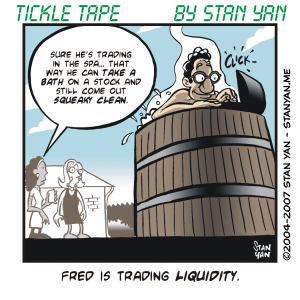Joe tells his trading coach, “I’ve been paper trading for six months, and I’ve been right 85% of the time, but I still have trouble pulling the trigger. It’s the 15% of the time where I may lose that bothers me. I don’t want to lose. Why do I hesitate? Why can’t I be more decisive?” There are many possible explanations for why Joe is having trouble executing his trades confidently and decisively. But let’s consider just a couple of possibilities.
It’s impossible to come up with a single possible reason to explain a given trader’s behaviour. There are many possible reasons. Each trader is different from his or her own personal set of circumstances. Any given explanation applies merely to some traders and only some of the time. In Joe’s case, he knows at one level that he has a potentially profitable trading method, but at a conscious or unconscious level, he hesitates. The first issue we must consider is the extent to which Joe’s hesitation reflects self-preservation.
Perhaps his psyche is warning him not to take unnecessary risks. An important maxim of trading is, don’t risk money you can’t afford to lose. A trader may have a method that works 85% of the time, but if he or she doesn’t have adequate capital to make the method pay off, then the method is essentially useless. Although sound trading methods are important, adequate capital is more important. You’ve got to have enough capital to survive drawdowns, the occasional unexpected adverse event, and commissions.
ul. There’s no easy solution to this problem. You must build up capital and put off trading actively until you have adequate capital. We’ve seen hundreds of would-be traders try to trade a $5,000 account, and with a few rare exceptions, they end up trading only a few months. If you can’t afford to lose your stake, you’ll be afraid to put on trades, no matter how foolproof your methods.
That said, a major reason some traders have difficulty executing trades with a cool, decisive and effortless mindset is that they are extreme perfectionists. As Joe says, “It’s the 15% of the time where I may lose that bothers me.” Even the best traders are wrong occasionally. Indeed, most traders are wrong a lot more than 15% of the time. Seasoned traders aren’t bothered by this fact, however.
They go into the markets expecting to lose occasionally. How can a novice trader deal with these feelings of uncertainty? First, it’s essential that you convince yourself that losses are inevitable, especially when you are first starting out. You can’t expect to win 100% of the time. Second, you must put losing trades in the proper perspective. You may lose part of the time, but you’ll tend to win enough times that you will make a profit in the end.
This is often hard to accept, especially for a person who tends to be prone to experience pessimism. There’s a pessimistic bias that some traders show: They mull over their trading errors and losses. They overly blame themselves for their mistakes. They try to think of ways the loss could have been avoided. This type of pessimism can be valuable and adaptive to the trader who is prone to experience overconfidence. A pessimistic view keeps the overly confident trader humble and grounded in reality. But for the true pessimist, focusing on past mistakes and losses can be extremely unproductive.
If you are prone to pessimistic biases, it’s useful to remind yourself of your tendency to exaggerate your faults and overly concern yourself with your limitations. It’s useful for the pessimist to try to ignore losses and relish wins. Pessimists would be wise to remind themselves, “A loss should be expected; it doesn’t mean anything in the long run; I should just forget about it.” Because the pessimist is debilitated by the pessimistic bias, it’s useful to use positive, uplifting self-talk (but if you’re prone toward overconfidence, it’s not a good idea. It’s better to keep your optimism restrained).
Although we can’t cover all the possible reasons for hesitation in a single column, you may want to consider the two main points we’ve covered. First, you may be under-capitalized, and your hesitation may protect you from taking unnecessary risks. And second, you may just be showing an unproductive pessimistic bias. Whatever the reasons, it’s essential that you identify the possible causes of your fears and overcome them. If you can, you’ll be able to cultivate the peak performance mindset of a winning trader.


